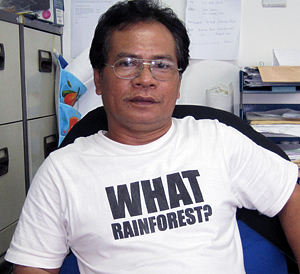
IN Oct 2010, indigenous rights activist Nicholas Mujah was arrested and remanded for three days with seven others from his village for an alleged fire in a logging camp.
The Sarawak Dayak Iban Association (Sadia) secretary-general has been fighting for the rights of Sarawak indigenous peoples to their native customary land since around 1980 and is no stranger to arbitrary arrest.
He became politically conscious after his arrest by police in 1983. He had helped seven European activists who wanted to stage a sit-in protest to block timber exports from Baram. The activists had asked Mujah for directions to get to the ship.
“I was still very ignorant [about these issues back then]. The old ladies met me in Miri and asked me how to get to the barge. I told them how to get there and because of that, the police thought I was their person-in-contact in Miri,” says Mujah.
He would later meet lawyer cum activist Harrison Ngau Laing from Friends of the Earth and learn more about these issues. Mujah returned to his village in 1984 and 1997 to defend his native customary land against loggers’ incursion. He was arrested on both occasions.
Mujah spoke to The Nut Graph on 24 Aug 2010 in Miri about growing up in an Iban village and the challenges of being an activist in Sarawak.
TNG: Where and when were you born?
Nicholas Mujah: I was born in 1960 in a traditional longhouse in Kampung Ensika Sebangan, Simunjan, Kota Samarahan.
Can you trace your ancestry?
Both my parents are Iban. My ancestors came from a place called Tampun Juah in Kalimantan, Indonesia and settled in Sarawak eight generations ago.
It takes about three hours’ walk through the jungle from the Sarawak-Kalimantan border to get to our original village. We are still in contact with our relatives over there.
Tell us some of the stories you remember the most from your grandparents or parents.
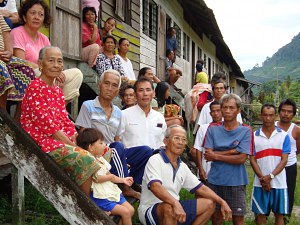
To the Dayaks, the entire island of Borneo was our motherland. Our people were only separated into Dayak Sarawak and Dayak Kalimantan because of the Dutch and British colonialists.
Actually, many lands near the current Malaysian-Indonesian border that are now considered Indonesian territory used to belong to Sarawak [and formerly the British]. And those that now belong to Sarawak were considered Indonesian [and formerly Dutch] territory.
The boundary between Sarawak and Indonesia was separated using the watershed principle — all rivers that flow into Kalimantan belong to Indonesia, [while] rivers that flow into Sarawak belong to Sarawak.
In 1965, the boundary was redefined. Maybe with more advanced technology, [the authorities] discovered that the rivers which they thought were flowing into Indonesia were actually flowing into Malaysia [and vice versa].
Because of the new land delineation, Indonesians who are now in Malaysian territory were considered Sarawakians [while] former Sarawakians became Indonesians. My cousin is a Sarawakian because the place where his family stays is [now considered] Malaysian territory but his father is Indonesian.
It’s easier for Sarawakians-turned-Indonesians to get citizenship from the Indonesian government but more difficult for Indonesians-turned-Sarawakians [to get Malaysian citizenship]. Many still hold their Indonesian identity card until now.
What was growing up like?
I went to a school near my longhouse. Our school was very poor, it was built using nipah palm as it was near the sea. It was about a two-hour walk [everyday] from our village, down from the mountain to the school.
I entered a boarding school for secondary school. It was about six hours by engine boat from our village. After that I studied Form 5 and Form 6 in Kuching and later entered Kolej Pertanian Malaya (now Universiti Putra Malaysia) in Serdang, Selangor to study economics under a government scholarship.
At that time there was no university in Sarawak and only a few universities and colleges in the country, so it was considered [a great] privilege to be able to enter college. I worked in the Statistics Department after I graduated but I didn’t like the job so I quit and joined an oil company.
How did you end up becoming an activist?
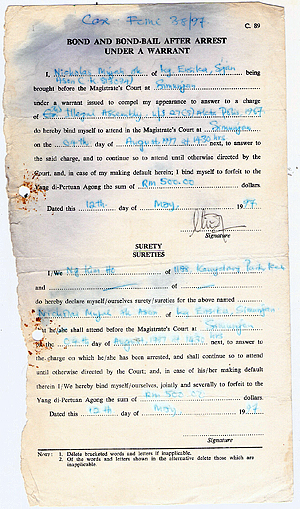
I was working in the oil industry when I met the seven European ladies and later Harrison. Not long after I became aware about these issues, I had to return to my hometown. Our lands were leased to logging companies and our elders were arrested [for resisting their intrusion].
My father brought a parang to chase away the loggers, but I thought we had to change strategy [to be more effective in our resistance]. From there I led the protest and I was arrested.
I was charged for illegal assembly in our own lands. The second charge against me was for instigating the people. I was remanded for two weeks while others were released after their statements were taken.
I’ve been remanded four times in my life. That was the first time. After that, neighbouring communities [who were facing the same land struggle] came to look for our help, and we helped them [to resist the logging companies’ intrusion].
After that my name was blacklisted by the police. Whenever a blockade happened, they would call me and ask me if I was there. Sometimes the community was too honest and told the police frankly I was there. (Chuckles)
Besides the police, have other authorities harassed you for what you do?
Every time I want to go to Peninsular Malaysia or overseas, I will be questioned by Immigration. They will ask me: “Where are you going? Why are you going there? Why is it always you?”
If I’m going for a seminar or training in Bangkok or Indonesia, they will demand [to see] the invitation letter from the organisers and question me about the event and host.
The police also monitors my movements; they have called my staff [in Sadia’s office] to ask them about my whereabouts.
What about the logging and oil palm companies?
I have been intimidated by loggers twice. Once they called me up: “Why are you involved? This is not your problem. You want your life? [Do you] still want to have your food?”
Another time they blocked my car, I was a little panicked but fortunately the local community happened to be near there, and the thugs went away.
They have tried to bribe us, too. Once, someone from the forestry department called me: “The company wants to negotiate, how much do you want?” I told him there was nothing to negotiate, the [indigenous] people don’t want their forest to be logged, that’s it.
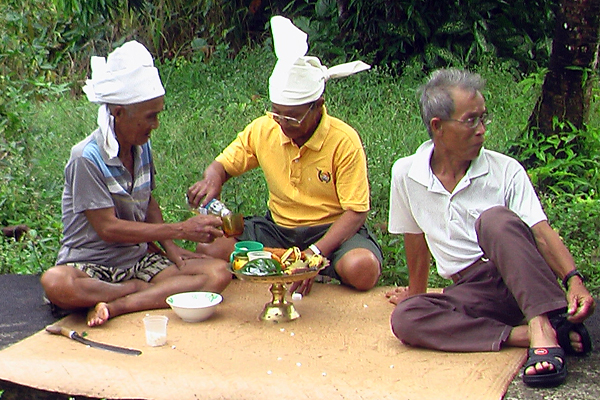
How do you connect with these stories as a Malaysian? Are there times when have you struggled with your identity as a Malaysian?
I don’t know if I can really call myself a Malaysian or 1Malaysia in [the current] context, or if such labels carry any real intention or meaning with them because:
For one, as a Dayak Iban, and correct me if I’m wrong, there is no provision in our constitution that says a Dayak Iban belongs to [this] land called Malaysia.
Secondly, I can proudly call myself a native of Sarawak, Malaysia, and [even] article 161A or 153 of our constitution placidly says that special attention must be given to [the natives], but in any legal documentation or form, there is no place for me, only Malay [Malaysian], Chinese [Malaysian], and Indian [Malaysian], what a Malaysia.
Thirdly, I’m very afraid that the Ibans [will be] prohibited from using “Allah” in our mother tongue [when no other word] can replace its meaning.
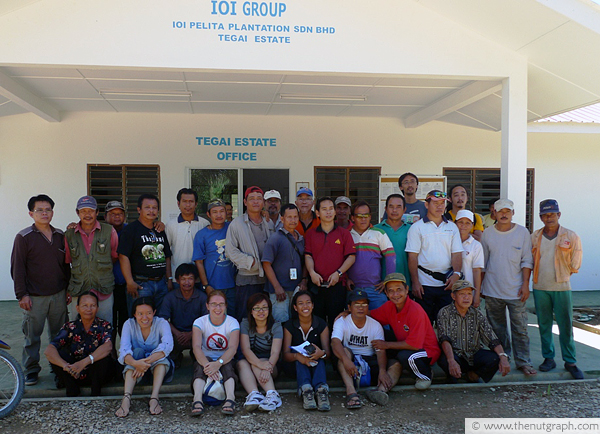
Describe the future you would like to see for Malaysia or your children.
I don’t hope much, I just hope to see some political changes.
We’ve a lot of resources if we look into our own backyard. And if we look at countries like Australia, the rich people are the [farmers]. If we can educate our children well in agriculture, they can cultivate their own lands [and prosper]…The situation in Sarawak is unique, the indigenous people are the majority, they should have control of the political situation but often, they don’t.
Some people are angry with this situation, but what’s the point? [We could do better] by educating and empowering our own communities, then we can control and decide our destiny in our own lands. ![]()
The book Found in Malaysia, featuring 50 of our best interviews plus four previously unpublished ones with Datuk Zaid Ibrahim, Tan Sri Rafidah Aziz, Datin Paduka Marina Mahathir and Ramli Ibrahim, is now available at all good bookstores for RM45.


Jay Chandra says
all hail to Mujah and his comrades in arms!
AR says
A refreshing interview after a slew of the same-ol’ same-ol’ artsy types. 😛
DLim says
When policies discriminate, they divide society. I can fully understand Mujah’s statement; I don’t know if I can really call myself a Malaysian. Kudos to you Mujah – instead of leading a contented life, you choose to fight against the odds for the benefit of your community. Your community needs more people like you. And indeed, if you want change, you must be involved in politics, as in being aware of one’s rights and voice your opinions and vote! Many people just tak faham that those who sit in Parliament make the rules that affect us all one way or another. East Malaysia has many resources, and you must fight for your own airport and good schools and universities. I often find it ridiculous having to fly to East Malaysia via KL coming from overseas. Good luck, Mujah. I am with you and your causes.
Ben says
I am so proud of you, my fellow Sarawakian. 🙂
terence says
Unfortunate for us, we don’t have responsible corporations, mostly because we condone a broken government system. We consumers should learn about corporates that are responsible and organise boycotts of companies that don’t respect rights. Unfortunately, Malaysians are too busy drinking their soy lattes and buying expensive designer goods from these very corporations.
MOTU says
How civillised and developed are we when we can still rob the original first peoples of the land of their land?
Danny Leebob says
I would like congratulate Mr. Nicholas for his courage and boldness in helping his people. I share the same concern for people and the well-being of Sarawak as a whole. However, I feel the Ibans are lacking something, and this is preventing them from progressing and being the master of their own lands and destiny.
I have lived and worked with the Ibans for a long time, and these are some of my observations:
1. When an Iban is working under somebody, he [or she] is normally very humble and courteous. But when he [or she] is appointed to a top position or a leadership role, he [or she] becomes proud and starts abusing his [or her] power. And slowly he [or she] loses leadership influence.
2. When an Iban is having a meal with a friend of other races, he [or she] will not pay for his [or her] meal. Even if the particular Chinese [Malaysian] is economically weaker than the Iban, the Chinese is expected to pay for the meals for all, because [there] is a mindset that the Chinese is the most able one.
3. When an Iban is working in a project with non-Ibans, there is a mindset [that] the non-Ibans, or generally the Chinese [Malaysians], are more capable, so the Chinese [Malaysians] will do all the organising and take up the leadership role, while the Ibans will lay back and wait for instructions.
4. In a teamwork scenario with other races, the Iban will expect the other races to do the work and the Iban just follow. There is a mindset that the others “take care” of everything. Therefore there is a lack of sense of responsibility.
The result is that Iban leaders are generally proud and abusive of their position and therefore are not united in fighting a common cause. Therefore Ibans are easily controlled by other races. especially in the political scenario. Ibans who are not leaders always have an inferiority complex and never take initiative. They not responsible-minded. Therefore they are easily manipulated and become passive followers.
Dennis Tan says
But we are absolutely sure you can call yourself a SARAWAKIAN? For us to feel malaysian (note the small m), we must have the inner sense to accept it. We cannot just accept things at face value. There are many approaches to make us feel this 1malaysia feeling, but we cannot run a country through slogans.
roselind says
All Sarawakians think they are first of all Sarawakians before they are Malaysians. That’s the fact of life as we Sarawakians see it.
roselind says
Agi idup agi ngelaban wei. Absolutely, we Sarawakians know we are Sarawakians…and that’s all that matters. Besides, they always say Malaysia is a multi-racial country with Malay, Chinese and Indians…did they ever mention iban, bidayuh, kayan, kenyah, kelabit, lun bawang, murut, berawan, penan, kedayan, bisaya, lahanan, sekapan,tagal, tabun,saban, sihan…etc… ?
Dennis Tan says
Danny Leebob had his piece to say, [so here’s] my point of view. I’m not generalising.
The effect [as Danny Leebob has stated] comes from the Ruai in the longhouses. The communal living conditions build kinship and bond between families, [and so there are many relatives in the community]. So this creates the mentality that Danny Leebob mentioned, [which is neither true nor untrue]. However, the pattern [among the urbanised Ibans] is not that distinct.
[I do know of many Ibans who are] better, more intelligent, more successful and independent, etc.
This is not an authoritative statement; merely my observations based on mixing and [spending time] with them.
Sarawak for Sarawakians.